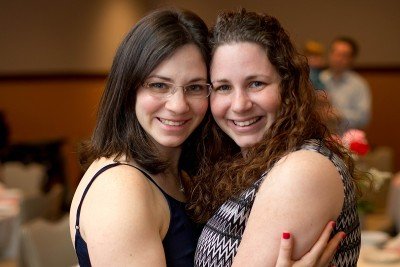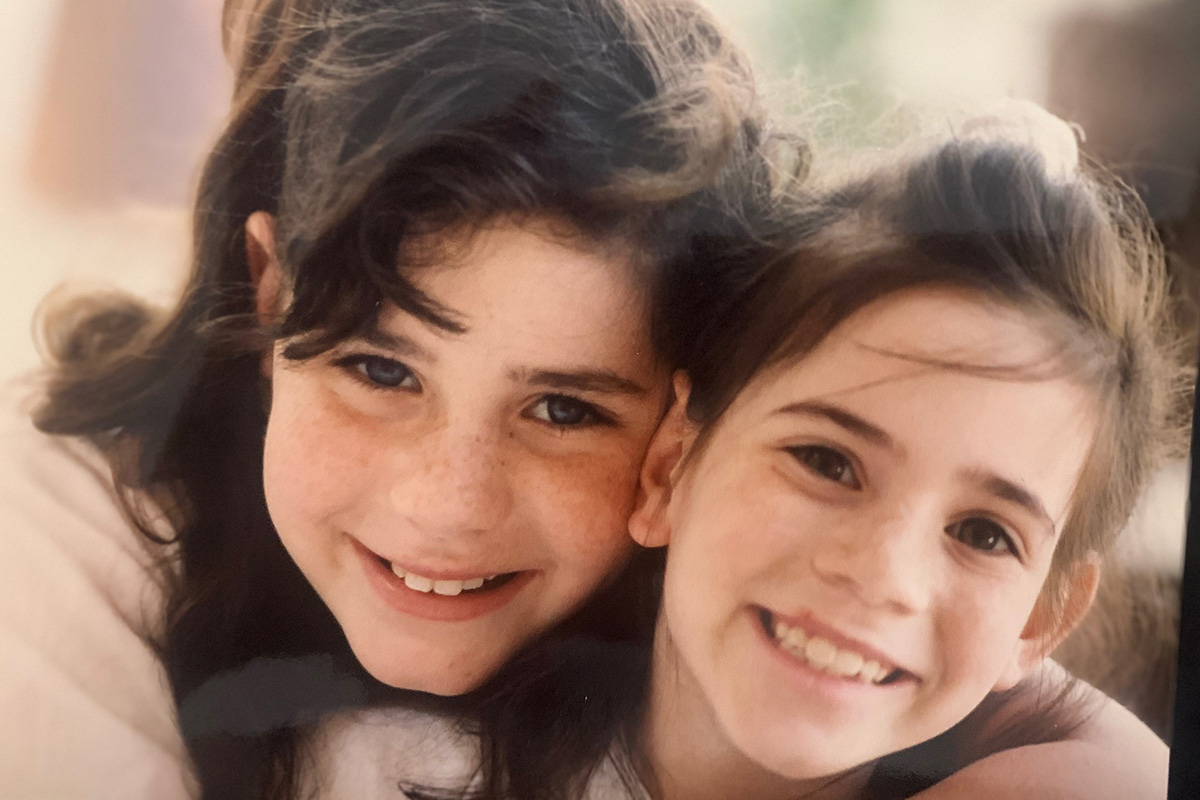Cancer Care Can’t Wait: How One Woman’s Cancer Diagnosis Helped Save Her Sister’s Life
When Rachel Zitofsky, 38, was diagnosed with breast cancer, little did she know, her diagnosis would help uncover lifesaving health information for her older sister, Leah Blanton. Learn more about MSK's genetic tests for breast cancer.

Sisters Rachel Zitofsky and Leah Blanton may have different personalities — Rachel is outgoing, Leah more soft-spoken — but they say they are each other’s “everything.”
Their childhood on Long Island was shattered when their father died of brain cancer. “After that, we became inseparable because losing a parent is so traumatic,” Leah recalls.
Twenty-some years later, the sisters didn’t expect cancer to re-enter their lives — during a pandemic, no less — or that their sisterly bond would turn out to be lifesaving.
A Life-Changing Diagnosis
Leah, who lives in Florida with her husband and two young kids, got a call from Rachel in early April 2020 to say that she had been diagnosed with stage II breast cancer after noticing a lump. “As soon as I got the call, I told my husband to drop everything, grab the kids, we’re getting in the car and going to New York,” Leah recalls. She couldn’t imagine not being at her sister’s side.

Leah’s family convinced her not to rush to New York and wait until Rachel knew more about the diagnosis and treatment plan.
Rachel went to Memorial Sloan Kettering Commack near her home and met with breast surgeon Lisa Sclafani to discuss next steps. “With a young patient like Rachel, we go over all the treatment options,” Dr. Sclafani says. “It’s important for a patient to get the whole picture.”
An MRI showed some additional suspicious spots in Rachel’s left breast, and it was decided that the best approach would be a mastectomy to remove the breast completely.
That left Rachel with another decision to make: Should she remove her right breast, too, to reduce the risk of her cancer spreading? “Dr. Sclafani told me whatever choice I made, we’d do it together and she’d support me,” Rachel recalls.
Genetic Testing Guides a Difficult Decision
As part of her presurgical testing, Dr. Sclafani connected Rachel with MSK’s Clinical Genetics Service (CGS). This is standard for all women with breast cancer who are diagnosed under age 45 or have other factors that raise the risk of breast cancer, such as family history. The CGS was able to provide uninterrupted care throughout the pandemic through telemedicine appointments.
Rachel met with genetic counselor Kimberly Amoroso, MS, CGC, who reviewed Rachel’s family history. In addition to her dad, all four of Rachel’s grandparents and several other family members had cancer. Ms. Amoroso ordered comprehensive genetic testing for Rachel for several reasons: Rachel’s young age and family history, plus her Ashkenazi Jewish heritage meant she was at a higher risk of having a genetic mutation known to cause cancer. Knowing if she had a mutation would help inform Rachel’s treatment, assess the odds of a second breast cancer developing, and uncover her risk for other cancers. The information could prove to be important for her sister, Leah, too.
When the results came in, Rachel learned she tested positive for a BRCA2 mutation, a gene alteration that’s most commonly associated with breast and ovarian cancers. This mutation dramatically increases the risk of developing a second breast cancer as well as ovarian cancer. Men with a BRCA2 mutation have an increased risk of breast and prostate cancer; the risk of pancreatic cancer and possibly melanoma are also higher in both women and men with the mutation.
“I was already leaning towards a double mastectomy,” recalls Rachel, the mother of young twins. “When you start to hear the percentages of the chances of the cancer coming back going up and up, it’s scary. The results confirmed my choice.”
Rachel learned she would also need to have her ovaries and fallopian tubes removed. “This is a potentially lifesaving surgery for individuals with BRCA2 mutations,” Ms. Amoroso says. “Unlike breast cancer, there are no screenings that have been proven to reduce the mortality rates of ovarian cancer.”
Dr. Sclafani helped Rachel build a care team centralized at MSK Commack so that she would not have to travel far from home for follow-up appointments after surgery. The team included gynecologic surgeon Emeline Aviki and reconstructive surgeon Evan Matros.
For Rachel and Leah, the coordination was a huge relief. “They helped with everything, like scheduling our many appointments and connecting us with the right people,” Leah says. “For such a terrible thing to go through, they made it extremely easy.”
“There’s just inherent comfort knowing you’re with MSK and the people are the best of the best,” Rachel adds.
Leah’s Surprising Discovery
When one sibling tests positive for a genetic mutation, it’s typically recommended for other siblings to be tested, too. Leah met with Ms. Amoroso in July while she was in New York taking care of Rachel after her surgeries.
Even before her results came back, Leah knew what she would do. Just a few weeks before Rachel’s breast cancer diagnosis, Leah had done an at-home, direct-to-consumer genetic test. “I told my sister, ‘If it’s positive, I’m having all the surgeries,’” Leah recalls. “When you see your whole family go through cancer, it makes you think differently.”
Leah also got a wake-up call about the false sense of assurance at-home genetic testing can provide. The direct-to-consumer test said Leah was negative for the three most common Ashkenazi Jewish founder mutations in the BRCA genes. But the expanded testing ordered by Ms. Amoroso showed something different: Leah had a type of BRCA2 mutation not accounted for by the at-home tests.
“Leah and I talked through all the scenarios and weighed the risks and benefits,” Ms. Amoroso recalls. Leah had the option to be monitored for breast cancer with frequent screenings using mammogram and breast MRI, but because a woman’s ovarian cancer risk increases in her 40s, Ms. Amoroso says, “I would not have wanted Leah to wait to remove her ovaries. We had no idea how long this pandemic could last. Nine months is enough time for a woman with a BRCA2 mutation to develop cancer.”
With encouragement and support from her family, she decided to have a double mastectomy and removal of her ovaries and fallopian tubes while staying in New York.
Drs. Sclafani, Aviki, and Matros performed Leah’s surgeries that September. For both sisters, the care team coordinated so that they would not have to undergo several separate procedures. Leah would have another procedure in December with Dr. Matros to finish her breast reconstruction.
Sister Helping Sister
As Rachel and Leah were recovering, Leah learned that tests on the tissue removed during her double mastectomy showed she had ductal carcinoma in situ, or stage 0 breast cancer.
“If I would have waited, that cancer could have grown, and I could have needed chemo and radiation. It could have been so much worse,” Leah says. “But I saw what my sister went through — her cancer saved my life.”
When Leah told her sister the news, “Rachel burst into tears,” Leah recalls.
But the sisters found humor in the moment too. “At the beginning of all this when I told Leah if my cancer somehow helped her it’d all be worth it, I was only kidding,” Rachel laughs. “Once I composed myself, I told Leah she owes me a fancy steak dinner.”
Four and a half years since Rachel’s diagnosis, she feels good and is taking tamoxifen to keep any potential cancer cells at bay. Leah is doing well and doesn’t take any cancer medication.
Sharing laughs has helped Rachel and Leah throughout their long journey. “It’s incredibly stressful and exhausting,” Leah says. “But we feel lucky because we know we have a good prognosis,” adds Rachel.




